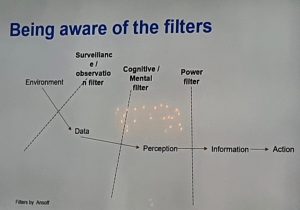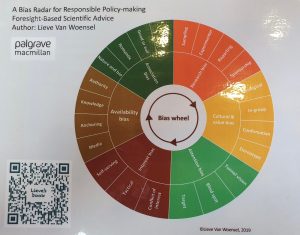
Cat Tully writes: I was fortunate enough to attend the OECD’s Government Foresight Community event in October, hosted by the OECD Foresight Councillor Duncan Cass-Beggs, and his team, Josh Polgar and Julia Staudt. It was a rich smorgasbord of ideas. We heard from around 90 government/public sector foresight leads about what’s happening in the world of public foresight.
Here are a few of the standout moments from where I was sitting.
- A presentation on the tradition and history of foresight in Japan, from the mid-70s, by Nobuyuku Shirakawa, a Japanese foresighter from NISTEP. Two traditions emerged. One focused on technological horizon scanning (Shell and Rand played important parts), the other more conventional trends watching. Nobu recommended reading influential Japanese futurist Prof Yuichi Washida’s book A Thinking Method to Prepare for Unforeseen Futures. (He also recommended this translation engine https://miraitranslate.com/trial/.)
Trustworthy foresight
- Lieve Van Woensel’s forthcoming book and presentation on trustworthy foresight for policy had some straightforward messages combined with some very nice tools. These enabled quick systems analysis using 5WH (Why, What, When, Where, Who, How), STEEP wheel and a bias-awareness wheel. I especially liked the bias tool (below). This connected to one of my favourite slides from the event. Jaana Tapanainen-Thiess shared a slide (above) summarising Ansoff on the observational, cognitive, and power filters we need to be aware of. Interestingly, Lieve referred to foresighters as “trusted guardians of policy-preparation.”

- Brexit was framed as a problem that was connected to International financial fraud. There are already difficulties dealing with emerging forms of financial crime, which could could exacerbated by cryptocurrencies and the emergence of quantum computing. One delegate said that most $1 billion financial frauds already go through the City of London. This will likely get worse if there is further deregulation after Brexit.
What ifs?
- We explored some provocative ‘what ifs’:
- What if government services are attacked by AI?
- What if the world’s largest market exists in a virtual world?
- What if global value chains split into regional blocs?
- What if we stop going out? (an HMRC scenario).
This last one has obvious implications for the gig economy and tax. But the discussion broadened to the nature of physical isolation – how important is human touch and eye-to-eye contact? Does it depend on our age? There’s emerging research about PTSD among drone army pilots, and personal development challenges that come from phone usage negatively affecting attachment processes in the development of children’s early interpersonal relationship. The picture is mixed.
Along the way, we got some great input on our continuing work on inter-generational fairness. Finally, I recommend the OECD’s short paper on ‘Strategic Foresight for Better Policies‘, published in October 2019.
